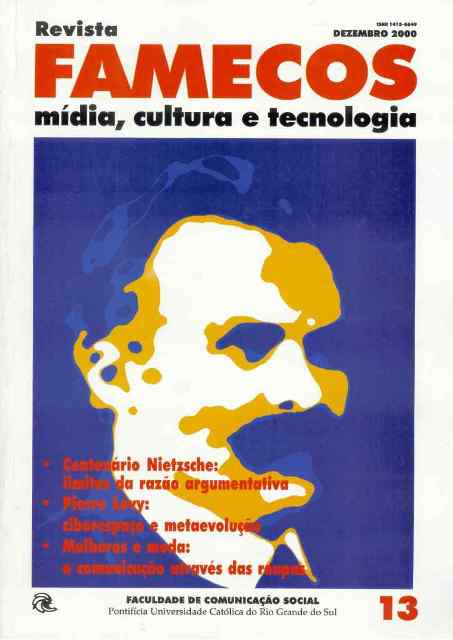Nietzsche's critique of mass culture
DOI:
https://doi.org/10.15448/1980-3729.2000.13.3078Keywords:
Communication, Nietzsche, Mass cultureAbstract
Reasoning about Nietzsche’s contribution to the mass culture debate, this article aims to underscore his internal contraditons from both an historical and from a cultural point of view, in order to situate the philosopher’s ideas about that subject vis-a-vis the advances of cultural modernity. The author adopts both a critical and a dialectical perspective in his reading of Nietzsche.Downloads
References
GOLDER, Herbert Introduction in Unmodern Observations. New Haven: Yale University Press, 1990
HAYMAN, Ronald Nietzsche: A Critical Life. New York: Penguin Books, 1980
HORKHEIMER, Max e ADORNO, Theodor Dialética do Esclarecimento. Rio de Janeiro: Jorge Zahar, 1985
LYOTARD, Jean-François Economie libidinale. Paris: Minuit, 1974
MARX, Karl Liberdade de Imprensa. Porto Alegre: L&PM, 1999
NIETZSCHE, Friedrich A Gaia Ciência § 108. São Paulo: Hemus, 1981
______, Friedrich Assim falou Zaratustra Rio de Janeiro: Civilização Brasileira, 1981
______, Friedrich Considerações Intempestivas. Lisboa, Presença, 1976
______, Friedrich Crepúsculo dos ídolos. São Paulo: Hemus, 1976
______, Friedrich O nascimento da tragédia. São Paulo: Cia. das Letras, 1992
STRAUSS, David Crente e escritor in Unmodern Observations. New Haven: Yale University Press, 1990
Downloads
Published
How to Cite
Issue
Section
License
Derechos de Autor
La sumisión de originales para la Revista Famecos implica la transferencia, por los autores, de los derechos de publicación. El copyright de los artículos de esta revista es el autor, junto con los derechos de la revista a la primera publicación. Los autores sólo podrán utilizar los mismos resultados en otras publicaciones indicando claramente a Revista Famecos como el medio de la publicación original.
Creative Commons License
Excepto donde especificado de modo diferente, se aplican a la materia publicada en este periódico los términos de una licencia Creative Commons Atribución 4.0 Internacional, que permite el uso irrestricto, la distribución y la reproducción en cualquier medio siempre y cuando la publicación original sea correctamente citada.






